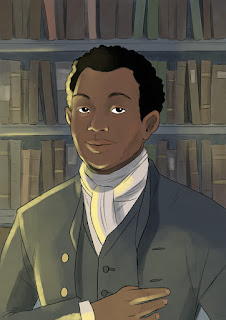It is always pleasing to see dignified portrayals of the historical Badin, such as this series of beautiful illustrations of Black Swedes by the talented Maria Fröhlich at Världskulturmuseerna in Stockholm.
However, the use of the word Hövtjänare is problematic.
Literally translated as "High servant" or "Cheif servant" we can concede that it is certainly a better descriptor than "slave"—which is typically attached to Badin.
However, the English translation at Sweden's World Culture Museums website, Världskulturmuseerna reads "Servant of the Royal Court."
The more appropriate, less insulting phrase in English should read "Member of the Royal Court."
Servants were not adored and treated like Badin was by Queen Lovisa Ulrika. They did not have close relationships with the queen's children throughout life. They did not grow up to own property and collect massive libraries.
For her, Badin was a confidant. A friend. A scholar. A son.
Swedes need to accept that Black inferiority and white supremacy are not independent of each other. Each one thrives because the other is tolerated. It is past time that Black Swedes such as Badin receive the respect due to them.
As historians and artists have no problem embellishing some of the most vile and undeserving characters in Swedish nobility, Badin is no less deserving of more respectful titles.
Moreover, the exclusion of the historical-fiction graphic novel, Badin and the Secret of the Saami—as well as the Stockholm Museum of Ethnography's own commissioned piece about an imaginary meeting between Badin and Anders Sparrman—in the sources section of the exhibit is troubling.
Although not directly related to Badin, any mention of "savage" must be thoroughly reconsidered in the presentation about Black Swedes in the 1900's. Certainly, there is a valid historical context that can support the term.
However, the same goes for the n-word. In a society where blatant discrimination against Black Swedes is so prevalent, using the word "savage" in the title is totally inappropriate and irrelevant.
Badin was not a slave, servant, savage, sex object or clown. He was Sweden's forgotten Black Prince. In the very least, he was a humble member of the Royal Court.


No comments:
Post a Comment